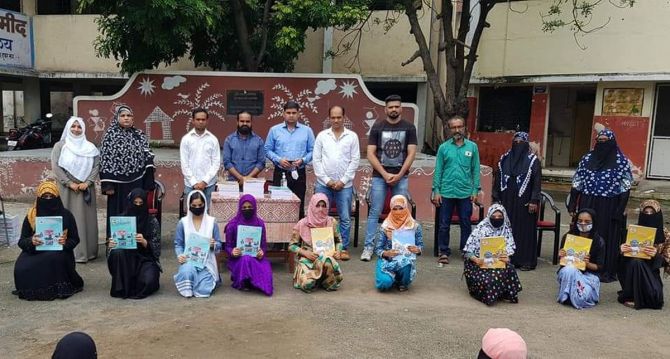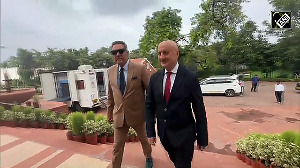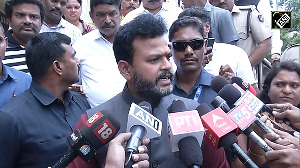Over the last decade, individual Muslims have started breaking from the tradition of sacrificing animals on Bakra Eid, motivated by the thought that the considerable amount spent on buying and sacrificing animals would be put to better use for the community's welfare, specially education.

Wednesday was a busy day for Pune activists Paigambar Shaikh, Alam Pathan and Rafique Shaikh. It marked the start of the distribution of funds collected by Paigambar through his 'Aarthik Qurbani' campaign.
It's happened elsewhere, but the 'Aarthik Qurbani' movement started by Pune activist Paigambar Shaikh is unique.
Over the last decade, individual Muslims have started breaking from the tradition of sacrificing animals on Bakra Eid, motivated by the thought that the considerable amount spent on buying and sacrificing animals would be put to better use for the community's welfare, specially education.
In Bengaluru, some of these Muslims have managed to convince others to follow their example. After the 2018 Kerala floods, social media helped convince many across the country to donate the money kept for the sacrifice, or at least a part of it, for the floods, as reported in Rediff.com.
However, Paigambar Shaikh's Aarthik Qurbani movement is different from all these, in that it is not restricted to Muslims. In fact, the campaign run by this self-employed content writer on Facebook, gets more responses from Hindus than Muslims, and the beneficiaries of the monetary sacrifice are also from all communities.
This reflects the concerns of 31-year-old Shaikh and his colleagues: All three are social activists, not just community activists.
"Not once has any Muslim who has contributed Aarthik Qurbani told us that his/her money should only go to Muslims," Paigambar tells Rediff.com Senior Contributor Jyoti Punwani. "And we would never accept such a condition."
The meat that is sacrificed on Bakra Eid, points out Paigambar, does not go only to Muslims. "It's in three parts: One kept for yourself, one for those who are needy among your relatives, and the third for the poor. The poor need not be from your community only," he explains.
"Also, the money you spend on buying animals does not go to Muslims; most of the sellers are non-Muslims," he points out.
However, since he started his campaign in 2014, more and more Muslims have been getting drawn to it. This year, of the 117 persons who donated, 50 were Muslim.
They collected almost Rs 95,000, less than earlier years, but more than what they expected, given the financial blow dealt by the two lockdowns.
On Wednesday they kicked off their distribution by donating educational material to two women, one Hindu, the other Muslim, who teach poor children for free. Needy students are their main beneficiaries, but they have also helped flood victims in Kerala and Maharashtra.
***

While orthodox Muslims oppose substituting animal sacrifice with monetary sacrifice, Paigambar reveals that it was his study of the Quran that prompted him to begin this practice.
"In the Quran it says one must sacrifice that which is dearest to our hearts. How can an animal that is purchased with the express aim of sacrificing it be the closest thing to our hearts," he asks.
In the last two years, the Maharashtra government has insisted that because of Covid compulsions, Muslims should perform a 'symbolic' sacrifice. But community leaders have rejected this suggestion, saying no such concept of symbolic sacrifice exists.
However, Paigambar Shaikh maintains that the Bakra Eid sacrifice is symbolic. "Hazrat Ibrahim dreamt that Allah had asked him to sacrifice that which was dearest to him, and prepared to sacrifice his son. But at the crucial moment, Allah presented a dumba (ram) for the sacrifice. Doesn't that show that it was a symbolic sacrifice? Our Aarthik Qurbani too is symbolic."
Finally, what set the seal on Paigambar's conviction were the words from the Quran: 'Their meat will not reach Allah, nor will their blood, but what reaches Him is piety from you.'
"It's the intention that counts," says Paigambar.
Those who oppose the concept of substituting charity for animal sacrifice point out that Bakra Eid is the one occasion that the poor get to eat mutton which is otherwise out of their reach.
However, asks Paigambar: "What is more important -- eating mutton or getting out of poverty? Those who go around distributing mutton to poor families, would be surprised to know that some of those families can't even afford to buy the half-a-dozen notebooks needed for their children's school. It's not in our hands to abolish poverty, but by enabling a poor family to educate its children, we are providing them a means to come out of their poverty."
At any rate, he adds, the prime motive for the animal sacrifice is not feeding the poor; it is pleasing God.

Rafique Shaikh joined Paigambar's campaign in 2019, when Sangli, Satara and Kolhapur were hit by floods. The eldest of four brothers, this 33-year-old businessman decided that the money they'd kept aside for sacrificing goats would go for the flood hit.
"The satisfaction we got from wiping the tears of those in distress by this sacrifice was a completely different experience," he recalls.
Alam Pathan was already performing Aarthik Qurbani since 2009. That year, Pathan's father died a day before Bakra Eid, and the family felt it inappropriate to celebrate the festival. Instead, they donated the money they would have spent on the animal sacrifice to the poor, and have since stuck to that practice.
Opposition from the orthodox, including threatening calls, have not fazed these men.
"We don't tell anybody to give up animal sacrifice," points out Rafique Shaikh. "This year, I could afford to sacrifice a goat and also make an Aarthik Qurbani, so I did both. One can buy a goat for Rs 11,000 or Rs 50,000. Isn't it wasteful to spend so much on one goat? We just suggest that instead of spending all that money on an animal, why not keep a part of it for those who need it?"
Alam Pathan has one way of dealing with opposition: Ignoring it.
Were he to heed opposition from the orthodox, this 39 year old's life would be very different.

As the only Muslim family in his village, says Pathan, the palkhi carrying the padukas of Sant Tukaram taken out during the annual Pandharpur pilgrimage, would stop at his house. He would participate in all the village bhajans and keertans, and continues to do Shri Dnyaneshwari Pravachan -- he lectures on the Dnyaneshwari written by the 13th century poet Sant Dnyaneshwar. He also visits the famous Tirupati Balaji temple in Andhra Pradesh every year.
"This is how my father brought us up," says the real estate dealer.
Paigambar Shaikh has received threatening calls for his campaign. But says he, he derives inspiration from two personalities when confronted with such opposition.
First, Prophet Mohammed, who said nothing even to the woman who threw garbage on him whenever he passed by her house. The day she didn't do so, he went to check if she was okay and tended to her.
That gesture made her accept Islam.
Paigambar's second inspiration is Shivaji Maharaj, who never accepted defeat.
"Aarthik Qurbani is now here to stay. No one can stop us. Next year onwards, we will be spreading the movement from Pune to other districts of Maharashtra."
Feature Presentation: Aslam Hunani/Rediff.com











